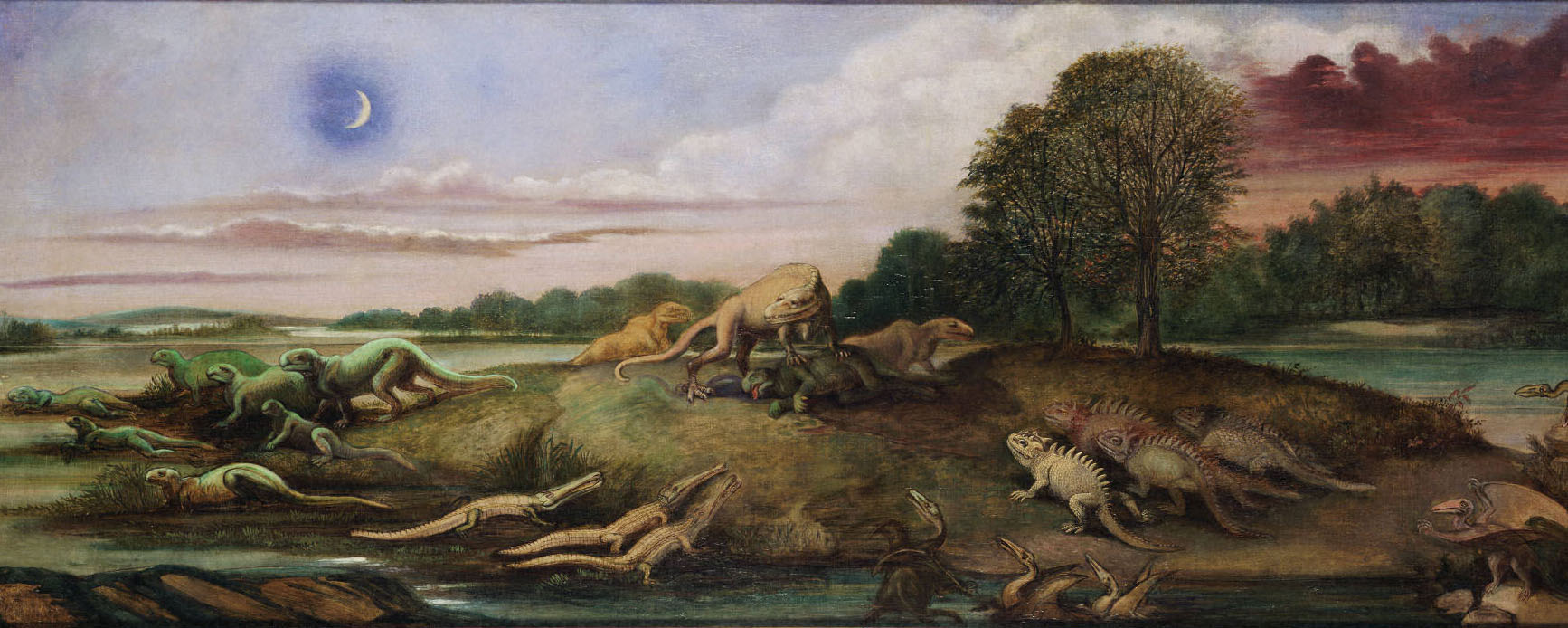


Instructor: Dr. Thomas R. Holtz, Jr.
Room: Geology Building (237 GEO) 4106
Office Hours (REVISED): Thurs 11:30 am-1 pm, or by appointment
Phone: (301) 405-4084, Email: ELMS Inbox (preferred) or tholtz@umd.edu
-Sir Richard Owen, British Fossil Reptiles, 1842
Course Description: Since their discovery in the early 19th Century, dinosaurs have fascinated both the scientific community and the general public. Alternatively the exemplars of power and adaptation or obsolesce and failure, the members of Dinosauria have been the best known of Life's ancient past to the world at large. But how do we know about them? How can we reconstruct their anatomy, their behavior, their evolution, and their extinction? And how can knowledge of these ancient animals help us understand the contemporary world? This Honors Seminar will focus on the nature of that understanding. Students in the program will examine the science behind dinosaur paleontology: how data derived from fossils are used to reveal the life and habits of these animals.
Students in this course will engage with the primary technical literature from scientific journals, as well as general audience sources in a variety of media. Through this they will see how paleontologists attempt to understand the biology of these organisms through a various means of analysis and inference, and will see how (and to what degree) alternatively hypotheses of the same evidence are evaluated. They will see how this information is transmitted from scientists to the general public. As a capstone of the course, each student will create their own example of a popular audience presentation of a scientific discovery about dinosaurs in a medium of their own choice.
Please note: one thing this course is NOT is a comprehensive survey of the diversity of dinosaurs, their biology, and their times (that course is GEOL 104 Dinosaurs: A Natural History). Instead, this course will examine a smaller subset of topics in depth and explore the relevant research around that subject.
Also please note: This Honors Seminar involves considerably more reading and writing than typical science courses. Nearly every week you will be reading at one or more article or video relevant to the topic. It is your responsibility to have read/screened these in advance and be read to be conversant on the contents.
Course Organization: Generally, one synchronous Zoom meeting every week, plus two asynchronous lectures on Panopto. See the lecture schedule for the dates of synchronous meetings.
Texts: No required textbook for purchase. However, please keep current with the online lecture notes.
There are a substantial number of short readings and screenings required for this course: these include technical papers from the scientific literature; essays for the general public; news reports from the press; YouTube explanatory videos; shorter documentaries; and others. These will be provided as links on the ELMS page. In some cases, every student will read that paper/screen that video; in others, subsets of the class are assigned different viewing/screenings and are responsible for sharing the information from these to the class as a whole.
Grade:
| Item | Percentage
| Discussion Participation (Discussion Board) | 5%
| Discussion Participation (In-meeting) | 15%
| Mastery Quizzes | 10%
| Individual Presentations | 20%
| Small Group Discussion Reports | 15%
| Panopto Quizzes | 5%
| Capstone Project | 30%
| |
|---|
Discussion Participation (Discussion Board) (5%): In order to prepare yourself for the weekly synchronous meetings (see next item), you will be asked to answer some question on the discussion board. Most weeks these discussions questions will be based on the paper you are reviewing for the meeting that Friday; in other weeks, the discussion question will be based on other prompts. These should be written up and submitted on ELMS prior to the relevant weekly discussion meeting.
Discussion Participation (In-meeting) (15%): As this is an Honors Seminar, all students are expected to attend every synchronous meeting and be an active participant when appropriate. In some classes, there may be directed interactive activities or discussions. Some meetings will involve Breakout Rooms. A default grade of 5 will be given for every meeting a student attends. They may be awarded up to 2 more points as extra credit for particularly helpful or effective participation in the meeting. Students who are present for a discussion section but are non-participants or are disruptive may be docked up to 2 and 4 points (respectively) at the instructor's discretion.
While the expectation is that students attend EVERY synchronous meeting, it is recognized that occasionally conditions (accident, illness, power failure, etc.) arise that prevent such. To recognize that, every student is allowed two absences from these meetings without penalty, so long as they inform Dr. Holtz by email (beforehand if at all possible), or certainly by the end of that same day that they will be/were absent and the reason for that absence. Should you not inform Dr. Holtz in a timely fashion, the students will receive a 0 for the grade for the discussion/participation for that day. Additionally, if there are more than two absences the student will receive a 0 for the grade each additional class time missed. (If there is a medical condition or other extraordinary circumstance that does require missing more than 2 class meetings--or missing the date of an individual in-class presentation of some form--the student must provide documentation from the appropriate sort of official (health professional; court official; etc.) explaining the absence.)
Mastery Quizzes (10%): In order to assess the mastery of knowledge within the course, there will be a series of quizzes delivered throughout the semester. These are delivered on ELMS, and will typically involve true/false, multiple choice, and/or identification questions. The lowest quiz grade is automatically dropped. For each of these you will have between 11 am two days before they are due until 11:55 pm the day they are due in which to complete them. These quizzes will be open-note, but they ARE subject to the Honor Pledge: you may not seek help from other people in doing these. The order in which the questions are asked, and the order of the answers are randomized, so no two student's quizzes will be identical. The lowest quiz grade will be automatically dropped; if you miss a quiz for any reason, it will be accommodated in this fashion. However, only one quiz at most will be dropped.
Individual Paper Presentations (20%): As a term project for the course you will have an individual presentation about a recent technical research paper in dinosaur paleontology, which will be presented as a shared presentation (e.g., PowerPoint, Keynote) during a synchronous meeting. More details about the logistics of the project, choosing your paper, grading rubric, the order of whom presents which week, etc., will be made available later this semester. Your grade will be assigned in part from your peers and in part from your instructor.
Small Group Discussion Reports (15%): On several days there will small group discussions in the synchronous meeting in addition to presentations. These discussions will focus on readings/screenings assigned in advance. These small groups will be in randomly assigned Breakout Rooms. The deliverable graded aspect of these discussions will be short reports turned in on ELMS. These will be a series of questions that you answer based on your collaboration; some of the questions are derived from advanced readings and writing; others from new related material presented in the report packet. All group members present that day receive the same grade on the report.
Panopto Quizzes (5%): Nearly every Panopto lecture there will be a tiny quiz (True/False or Multiple Choice) which is incorporated into the video. (As an aside: any given lecture is broken up into several videos for ease of viewing. Not every segment will have a quiz.) These are meant to keep focus on some of the important topics in the material. The lowest three (3) Panopto Quiz grades will automatically be dropped.
Capstone Project (30% total): The primary project for the later part of the course is a creative project concerning dinosaurs and dinosaur research which you develop. The possible type of project is very broad: indeed, part of the assignment is coming up with not only the topic but the presentation format you will use. Just to give you a sense of possible project formats, here are some possibilities:
Learning Outcomes: By the end of the semester, every student should be able to:
Course Themes: This course examines how scientists study the age, environments, evolution, origin, biology, behavior, and extinction of dinosaurs and the other inhabitants of their world. Over this time we will explore several big themes:
EXPECTATIONS & POLICIES
Expectations & Attendance: Attendance in the synchronous meetings is required. The Honors Seminars require you to do more than simply master the information; you must be able to intelligently communicate and discuss
Communication in this course will primarily be by means of the ELMS Inbox email system. In cases of inclement weather or other unexpected emergencies, the University may close. Please consult the University main webpage or call 301-405-7669 (SNOW) to confirm such cancellations. Dr. Holtz will contact students via ELMS in order to inform them concerning delays of due dates for projects to be handed in or for exams: typically these will be shifted until the next available class date.
Memorization: As part of the nature of the course, there will be a lot of memorization (less than a foreign language class, but more than that found in more mathematically-oriented introductory science classes). This will include lots of anatomical, geological, and paleontological terms, as well as evolutionary and temporal relationships. If you have difficulty memorizing, this may not be the class for you. Also, if there are words or concepts with which you are not familiar, feel free to ask Dr. Holtz (in class, after class, over email, etc.) for an explanation or clarification.
General Policies: The University has provided a page on Academic policies here. Each student is responsible for reviewing this page with regards to issues of Academic Integrity; the Code of Student Conduct; Sexual Misconduct; Discrimination; Accessibility; Attendance, Absences, or Missed Assignments; Student Rights Regarding Undergraduate Courses; Official UMD Communication; Mid-Term Grades; Complaints About Course Final Grades; Copyright and Intellectual Property; Final Exams and Course Evaluations; and Campus Resources.
Laptop/Tablet/Smartphone Use: Given the reliance on technology this semester, please make certain that you have access to appropriate hardware, software, and Internet connections. If you are concerned about your ability to connect remotely for this course, please consult the following information about solutions provided by the Division of Information Technology:
Copyright © 2020 Thomas R. Holtz, Jr. as to this syllabus, all lectures, and all written material provided in this course. Students are prohibited from copying and selling course materials, from selling lecture notes, and from being paid to take lecture notes without the express written permission of the professor teaching this course. Violations of this prohibition will be treated as violations of the University Honors Code and reported and dealt with accordingly.
For a formatted printable copy of the complete syllabus, click here.
